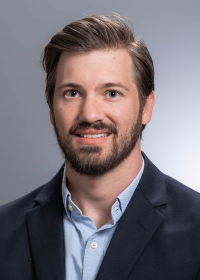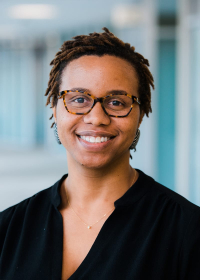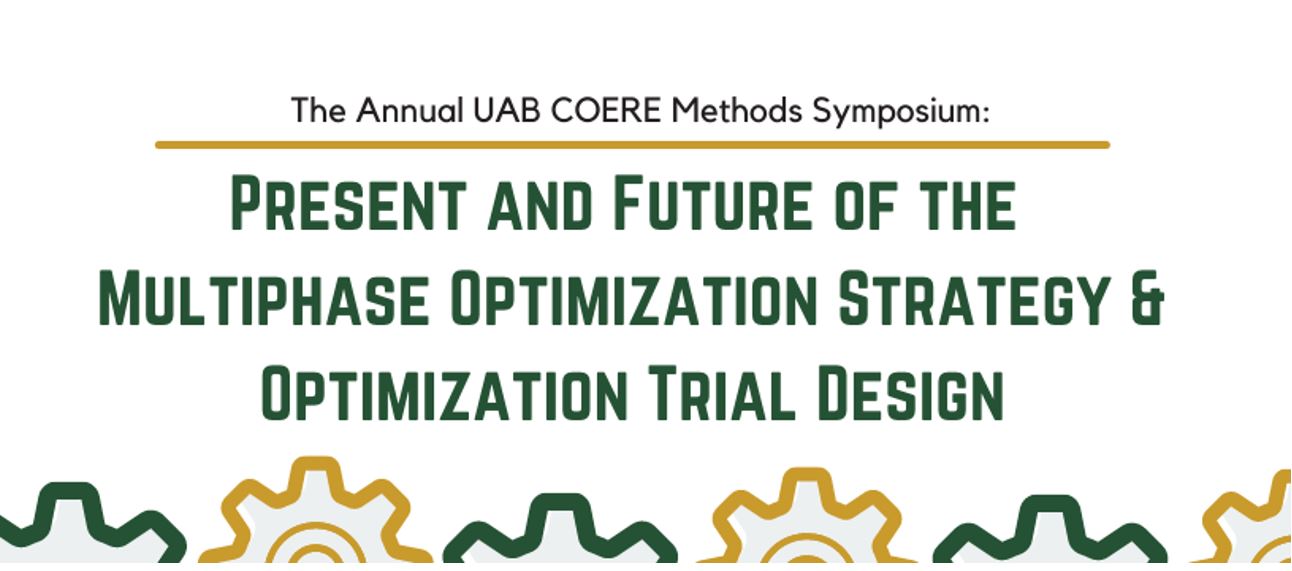-
-
2024 Methods Symposium - Scientific Methods to Support Implementation Sciences
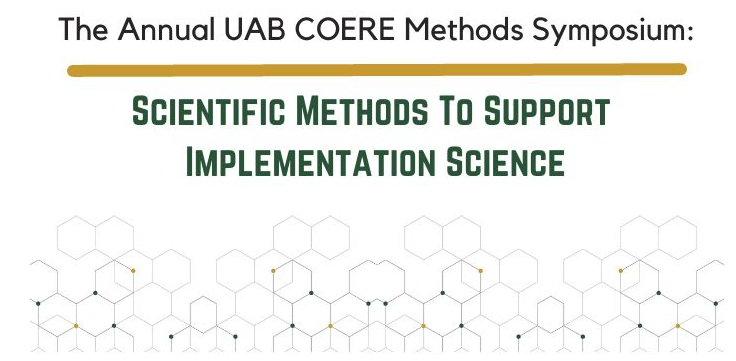
Centered around the theme of Implementation Science, the Annual COERE Methods Symposium is a half-day event featuring presentations by national thought leaders and UAB scholars in the field. This symposium aims to offer a comprehensive overview for a diverse research audience on health services and outcomes while also delving into recent developments and innovative directions. This symposium will feature talks on methods, models, and frameworks relevant to the field of implementation science. Composed of four distinguished speakers, this year's symposium will feature talks from Drs. Eva Woodward from the University of Arkansas for Medical Sciences, Jereme Wilroy from The University of Alabama at Birmingham, and Alicia Bunger from The Ohio State University. The symposium reaches its pinnacle with the Meredith Kilgore Endowed Lectureship delivered by Dr. Maria Fernandez from the University of Texas Health Science Center at Houston, generously sponsored by the UAB School of Public Health. Established in 2020, the Kilgore Endowed Lectureship serves as a tribute to the late Dr. Kilgore, commemorating his substantial contributions to health services and outcomes research, as well as his impactful roles as the Co-Director of the COERE and the UAB Health Services Research Training Program.Thursday, January 18, 2024, from 8:30-1:30PM
The Edge of Chaos (1700 University Blvd, 4th Floor of Lister Hill Libary) with Hybrid OptionSpeakers
-
María E. Fernández, PhD
María E. Fernández, PhD
María E. Fernández, PhD
UTHealth Houston
Dr. María Fernández is Vice President of Population Health and Implementation Science at the University of Texas Health Science Center at Houston (UTHealth Houston) and the founding Co-Director of the UTHealth Houston Institute for Implementation Science. Dr. Fernández is also the Lorne Bain Distinguished Professor of Public Health and Medicine, Professor of Health Promotion and Behavioral Sciences, and Director of the UTHealth Houston Center for Health Promotion and Prevention Research (CHPPR) at the UTHealth Houston School of Public Health. As a researcher and a leader, Dr. Fernández has spent her career conducting participatory community-engaged research and practice to develop, evaluate, implement, and disseminate interventions to improve health and health equity. Her research focuses on cancer and chronic disease prevention and control among underserved populations in the U.S. and globally. Dr. Fernández is an expert in dissemination and implementation (D&I) research, having served as a member of the National Institutes of Health (NIH) Dissemination and Implementation Research in Health Study Section and as faculty for several national and international D&I training programs. Dr. Fernández has an extensive portfolio of global, federal, and state-funded research developing and improving evidence-based interventions and guidelines for the prevention and control of cancer, diabetes, and cardiovascular disease in clinical and public health settings. Dr. Fernández has over 200 peer-reviewed publications and has co-authored several books, including the 4th edition of Planning Health Promotion Programs: An Intervention Mapping Approach (2016) and the Handbook of Community-based Participatory Research (2017). Her awards include the Association for Schools and Programs of Public Health Research Excellence Award and the UTHealth President's Scholar Award for Research Excellence. -
Alicia C. Bunger, MSW, PhD
Alicia C. Bunger, MSW, PhD
Alicia C. Bunger, MSW, PhD
The Ohio State University
Alicia C. Bunger, MSW, PhD is an Associate Professor at the College of Social Work at The Ohio State University. Her research program centers on how health and human service organizations coordinate to implement evidence-based interventions, promote service access across systems, and integrate care for children and families. Bunger’s research engages community partners to examine organizational and system-level strategies by blending implementation and inter-organizational relationships research. This work often focuses on the intersection of child welfare and behavioral health systems. It is designed to inform strategies for closing gaps in care access and quality. She is trained as a mental health services researcher with an emphasis on implementation in organizations and systems. Bunger earned a PhD in social work from Washington University in St. Louis and completed post-doctoral training in mental health services and systems research at the University of North Carolina at Chapel Hill. Her work has been funded by the National Institutes of Health, Robert Wood Johnson Foundation, and US Children’s Bureau, among others. Bunger's profile at the College of Social Work can be found here: https://csw.osu.edu/about/faculty-staff/faculty-directory/bunger-alicia-ph-d/ -
Eva Woodward, PhD
Eva Woodward, PhD
Eva Woodward, PhD
University of Arkansas for Medical Sciences
Dr. Eva Woodward is a clinical health psychologist and implementation scientist. In her research, she uses implementation science and practice, community engaged research, and mixed methods to improve equitable health care delivery for groups experiencing disparities and oppression, such as racially minoritized, sexual minority (lesbian, gay, bisexual, queer), low-income, and rural-dwelling individuals. Her work focuses on implementing interventions in hospital settings. She complements her research as a clinician in primary care mental health integration. She is also a trainer for the Implementation Facilitation Learning Hub operated by Behavioral Health Quality Enhancement Research Initiative through the Veterans Health Administration. Dr. Woodward currently works at the VA Center for Mental Healthcare and Outcomes Research (Little Rock, Arkansas) and University of Arkansas for Medical Sciences. Originally from rural Oklahoma, she trained at Suffolk University in Boston (Ph.D.) and Brown University in Providence (internship/residency). Dr. Woodward completed the two-year Advanced Fellowship Program at the VA South Central Mental Illness Research, Education and Clinical Center in Little Rock before becoming faculty. She also graduated from the NIH Health Disparities Research Institute, and the Implementation Research Institute fellowship at Washington University in St. Louis. As a trainee, she was awarded the Distinguished Student Contribution from the American Psychological Association’s division on Sexual Orientation and Gender Diversity. Research interests: implementation science, health equity, primary care mental health integration, health psychology, implementation facilitation. -
Jereme Wilroy, PhD
Jereme Wilroy, PhD
Jereme Wilroy, PhD
University of Alabama at Birmingham
Dr. Wilroy received his B.S. degree in Exercise Science, M.A. in Health Studies, and PhD in Health Education and Promotion from the University of Alabama. He completed two post-doctoral fellowships; one-year at Lakeshore Foundation in Birmingham, Alabama, and two years at the University of Alabama at Birmingham. He began his research career at UA as a master’s student surveying individuals with disabilities about topics of interest for a holistic health website. As a doctoral student, he developed and validated a theory-based instrument to predict physical activity among people with spinal cord injury as part of his dissertation and funded with a fellowship through the graduate school. As a post-doc, he obtained a fellowship from the Craig H. Neilsen Foundation and developed an online program for increasing physical activity behavior among people with spinal cord injury. Dr. Wilroy’s research philosophy is to conduct research that centers on the needs of the patient and improves the capacity of clinicians to recommend specific exercise routines. The focus of his research is on the psychosocial aspects of adherence to exercise trials among people with physical disabilities. His current research projects include: a) recruiting PM&R patients into a large randomized controlled trial of a home-based exercise intervention, and b) identifying decisions points for piloting a sequential multiphase assignment randomized trial of an exercise and behavioral coaching intervention for people with physical disabilities.
-
2024 Recordings
2024 Recordings
Broadening Perspectives to Use Equity-Aligned Implementation Strategies
PowerPoint Slides
Eva Woodward, PhD
University of Arkansas for Medical SciencesImplementing Exercise Trials in Disability Populations: Story, Strategy, and Science
PowerPoint Slides
Jereme Wilroy, PhD
University of Alabama at BirminghamSocial Network Analysis for Investigating and Supporting Implementation
PowerPoint Slides
Alicia Bunger, MSW, PhD
The Ohio State UniversityImplementation Mapping: Designing Strategies to Improve Adoption, Implementation, and Sustainment of Evidenced-Based Interventions
PowerPoint Slides
Meredith Kilgore Endowed Lecturer
Maria Fernandez, PhD
University of Texas, Health Science Center at Houston
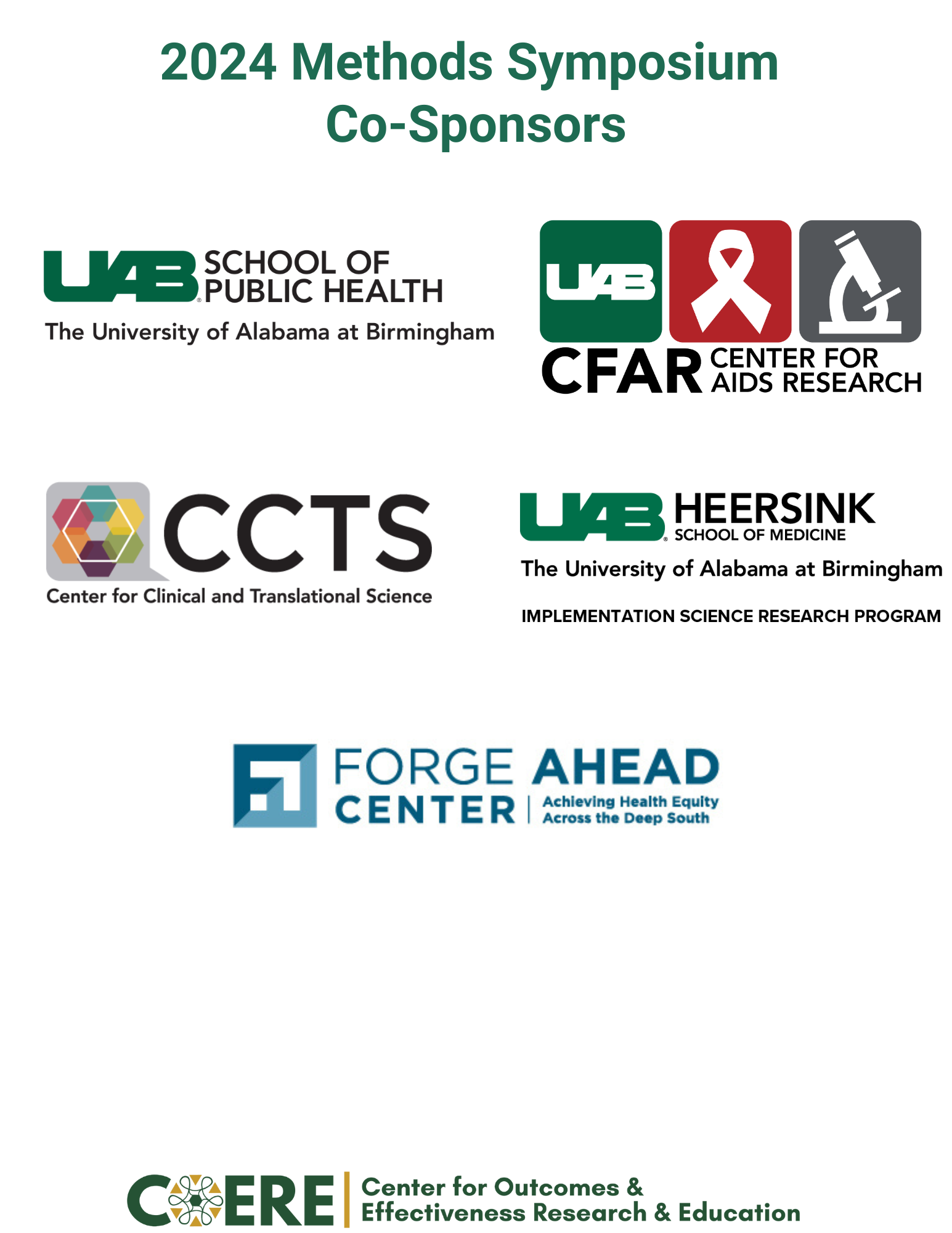
-
María E. Fernández, PhD
-
2023 Methods Symposium - Scientific Methods to Support Health Equity Research

Centered around the theme of Scientific Methods to Support Health Equity research, the Annual COERE Methods Symposium is a half-day event featuring presentations by national thought leaders and UAB scholars in the field. This symposium aims to offer a comprehensive overview for a diverse health services and outcomes research audience while also delving into recent developments and innovative directions. The 2023 symposium featured talks on methods, models, and frameworks relevant to the field of health equity. Composed of four distinguished speakers, the 2023 symposium included Drs. Brita Roy from NYU Grossman School of Medicine, Dione King from The University of Alabama at Birmingham, and Patrick Sullivan from Emory University, Rollins School of Public Health. The symposium reached its pinnacle with the Meredith Kilgore Endowed Lectureship delivered by Dr. Olugbenga Ogedegbe from NYU Grossman School of Medicine, generously sponsored by the UAB School of Public Health. Established in 2020, the Kilgore Endowed Lectureship serves as a tribute to the late Dr. Kilgore, commemorating his substantial contributions to health services and outcomes research, as well as his impactful roles as the Co-Director of the COERE and the UAB Health Services Research Training Program. The Symposium continues to reach large local and national audiences with 63 attendees in-person and 130 attendees online.
Thursday, January 19, 2023, from 8:00-12:00PM
The Edge of Chaos (1700 University Blvd, 4th Floor of Lister Hill Libary) with Hybrid OptionSpeakers
-
Olugbenga Ogedegbe, MD, MPH
Olugbenga Ogedegbe, MD, MPH
Gbenga Ogedegbe, MD, MPH
NYU Grossman School of Medicine
Gbenga Ogedegbe, a physician, is Professor of Population Health & Medicine, Chief Division of Health & Behavior, and Director Center for Healthful Behavior Change at the NYU Grossman School of Medicine. Gbenga is a leading expert on health disparities research; his work focuses on the implementation of evidence-based interventions for cardiovascular risk reduction in minority populations. He is Principal Investigator on numerous NIH projects and has expanded his work globally to Sub-Saharan Africa where he is funded by the NIH to strengthen research capacity and reduce the burden of non-communicable diseases. He has co-authored over 250 publications and his work has been recognized by receipt of several research and mentoring awards including the prestigious John M. Eisenberg Excellence in Mentorship Award from the Agency for Healthcare Research and Quality, and the Daniel Savage Science Award. He has served on numerous scientific panels including the NIH, CDC, World Health Organization, and the European Union Research Council. Prior to joining NYU, he was faculty at Cornell Weill Medical School and Columbia University College of Physicians and Surgeons. -
Patrick Sullivan, DVM, PhD
Patrick Sullivan, DVM, PhD
Patrick Sullivan, DVM, PhD
Emory University, Rollins School of Public Health
Patrick Sullivan is the Charles Howard Candler Professor of Epidemiology at Emory University’s Rollins School of Public Health, and Co-Director of the Prevention Sciences Core at Emory’s Center for AIDS Research (CFAR). He has worked in HIV prevention for 26 years. Before coming to his current position at Emory, Patrick worked at CDC as an EIS officer and in HIV Surveillance programs.
Dr. Sullivan’s research focuses on HIV among men who have sex with men, including behavioral research, interventions, implementation, and surveillance, and he is a PI in the UNC/Emory Adolescent Trials Network Center and a member of the HPTN SGM Scientific Committee. -
Dione King, PhD
Dione King, PhD
Dione King, PhD
University of Alabama at Birmingham
Dione King is an Associate Professor in the Department of Social Work at UAB's College of Arts and Sciences. Dr. King’s long-standing commitment to disadvantaged, vulnerable, and marginalized populations is evidenced through her professional and research experiences working with children and families in juvenile justice, child welfare, education, nonprofit, and homeless/transitional housing settings. Her research focuses on health behaviors and health disparities that impact the adolescent and young adult life experience including dating violence, delinquency, substance use, mental health, and sexual risk behaviors while giving attention to social determinants of health and the promotion of health behaviors.
Dr. King lives by the motto, “Injustice anywhere is a threat to justice. We are caught in an inescapable network of mutuality, tied in a single garment of destiny. Whatever affects one directly, affects all indirectly.” This quote taken directly from Dr. Martin Luther King Jr.’s 1963 Letter from a Birmingham jail has resonated with her as a social worker and reflects the impact she seeks to make in the lives of individuals, families, communities, and systems. -
Brita Roy, MD, MPH, MHS
Brita Roy, MD, MPH, MHS
Brita Roy, MD, MPH, MHS
NYU Grossman School of Medicine
Brita Roy, MD, MPH, MHS is Associate Professor of Population Health and Medicine and Director of Community Health and Clinical Outcomes for Beyond Bridges.
Dr. Roy is a clinician-investigator who uses epidemiology, complex systems modeling, and community-engaged approaches to investigate the effect of positive psychosocial factors on health outcomes at the individual, community, and clinic/health system levels. She co-authored an evidence-based, actionable, community-level theoretical framework defining and describing collective well-being and its drivers and outcomes. She works to implement programs and processes to improve health outcomes equitably across our health system and communities that we serve. Finally, Dr. Roy also enjoys teaching health professions students and internal medicine residents in the classroom while taking care of a diverse array of patients on the inpatient general medicine service.
-
2023 Recordings
Incorporating Photovoice into Adolescent and young adult (AYA) Social and behavioral health research
Dione King, PhD
University of Alabama at BirminghamCollective Well-being: A Framework to Improve Population Health
Brita Roy, MD, MPH, MHS
NYU Grossman School of MedicineMetrics for monitoring PrEP uptake: An equity-based approach
Patrick Sullivan, DVM, PhD
Emory University, Rollins School of Public HealthHaving Impact Through Research: You See My Glory But You Don’t Know My Story
Meredith Kilgore Endowed Lecturer
Gbenga Ogedegbe, MD, MPH
NYU Grossman School of Medicine
Thank you to our 2023 Sponsors:
-
Olugbenga Ogedegbe, MD, MPH
-
2022 Methods Symposium - Present and Future of the Multiphase Optimization Strategy & Optimization Trial Design
Featuring the Meredith Kilgore Endowed Lecturer, Linda Collins, PhD, this half-day virtual symposium is designed to provide local and national attendees with a general overview, recent developments, and current projects regarding the multiphase optimization strategy of intervention development and testing.
Thursday, February 17, 2022, from 8:00-12:30PM
Zoom
Speakers
-
Linda M. Collins, PhD
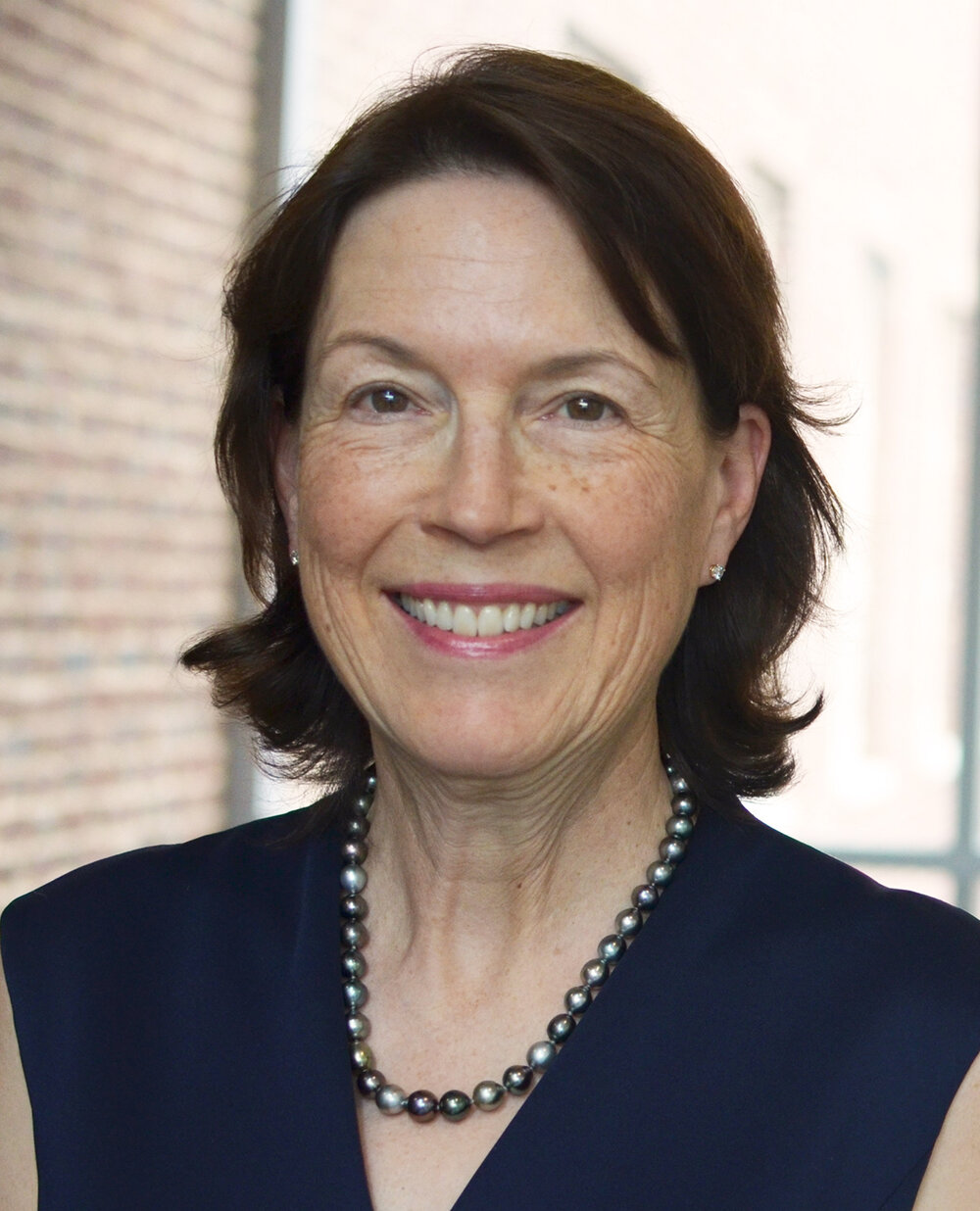
Linda M. Collins, PhD
Linda M. Collins, PhD
NYU School of Global Public Health
Linda M. Collins is Professor of Global Public Health in the Department of Social and Behavioral Sciences, with a secondary appointment in the Department of Biostatistics. She earned her B.A. in Psychology at the University of Connecticut and her Ph.D. in Quantitative Psychology at the University of Southern California.
Collins’ research interests are focused on the development, dissemination, and application of the multiphase optimization strategy (MOST), a framework for the optimization of behavioral, biobehavioral, and social-structural interventions. The objective of MOST is to improve intervention effectiveness, efficiency, economy, and scalability. She is currently collaborating on research applying MOST in the areas of smoking cessation, the prevention of excessive drinking and risky sex in college students, and HIV services. -
Kate Guastaferro, PhD, MPH
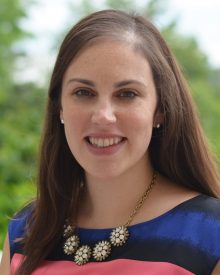
Kate Guastaferro, PhD, MPH
Kate Guastaferro, PhD, MPH
Penn State College of Health and Human Development
Kate Guastaferro, Ph.D. is an Assistant Research Professor in the Center for Healthy Children, and an affiliate of the Child Maltreatment Solutions Network as well as the Edna Bennett Pierce Prevention Research Center, at The Pennsylvania State University. Kate’s program of research sits at the intersection of prevention science and innovative methods.
Kate is committed to the prevention of child maltreatment. Her focus during her time at Penn State has focused predominantly on the prevention of child sexual abuse. Kate led the development of a parent-focused child sexual abuse prevention module designed to be added to existing evidence-based programs. She also collaborates with Dr. Jennie Noll on the implementation and evaluation of a state-wide child sexual abuse prevention strategy.
She is also interested in innovative methods for intervention development, optimization, and evaluation. She is an expert in the multiphase optimization strategy (MOST), an engineering inspired framework for building interventions that are effective, efficient, economical, and scalable. Kate has experience applying MOST to a variety of public health problems, including STI prevention among first year college students.
Kate received her PhD in Public Health from Georgia State University in 2016, receiving the Public Health Achievement Award recognizing her scholarship and academic success. She completed her undergraduate work at Boston University in 2008 and received her MPH from Georgia State in 2011. Kate’s vision is to integrate her substantive and methodological interests to develop, optimize, evaluate, and disseminate child maltreatment prevention programs that are effective, efficient, economical, and scalable. -
Drew Sayer, PhD
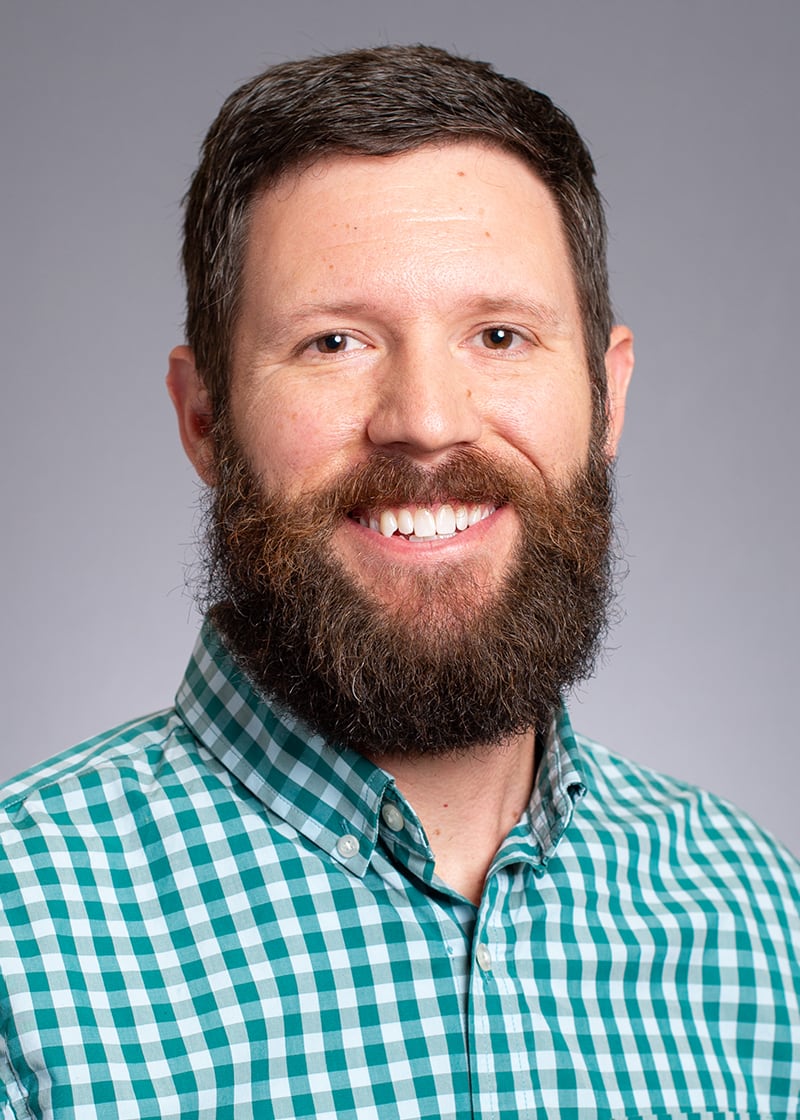
Drew Sayer, PhD
Drew Sayer, PhD
The University of Alabama at Birmingham
Dr. Sayer is Assistant Professor in the Department of Nutrition Sciences at the University of Alabama at Birmingham. His clinical research relies heavily on the Multiphase Optimization Strategy (MOST) Framework and, in particular, the Sequential Multiple Assignment Randomized Trial (SMART) experimental approach. Using these approaches, Dr. Sayer is conducting 3 ongoing SMARTs with an overarching goal of developing effective, efficient, and personalized adaptive treatment strategies for improving the health and wellbeing of people with obesity. -
Rachel Wells, PhD, MSN, RN, CNL

Rachel Wells, PhD, MSN, RN, CNL
Rachel Wells, PhD, MSN, RN, CNL
University of Alabama at Birmingham
Dr. Rachel Wells is a NIH/NINR-funded (1K99NR019854) postdoctoral fellow at the University of Alabama at Birmingham School of Nursing. She received a BS in Microbiology, English, and Latin/Greek (2006) from the University of Alabama and MSN (2010) and PhD (2019) in Nursing from the University of Alabama at Birmingham. She has an extensive clinical background in critical care and adult cardiovascular health.
Dr. Wells’ cardiovascular nursing practice, experiences in seeking specialty care as a rural dweller, and research experiences as a palliative nurse coordinator inspire her research interest in optimizing early palliative care models for under-resourced advanced heart failure patients and their family caregivers in the rural Deep South. She is interested in improving cardiovascular outcomes and pain management disparities and access to care for those living with advanced heart failure and other serious illness through innovative behavioral intervention development.
-
2022 Recordings
Optimization of Behavioral and Biobehavioral Interventions: A MOST Primer
Rachel Wells, PhD, MSN, RN, CNL
University of Alabama at BirminghamApplying the Multiphase Optimization Strategy (MOST) to Your Field: A Case Study in Child Maltreatment Prevention
Kate Guastaferro, PhD, MPH
Penn State College of Health and Human DevelopmentSMART Lifestyle Interventions for Improving Health and Wellbeing in People with Obesity
Drew Sayer, PhD
University of Alabama at BirminghamThe Multiphase Optimization Strategy (MOST): Current and Future Directions
Meredith Kilgore Endowed Lecturer
Linda Collins, PhD
NYU School of Global Public Health
-
Linda M. Collins, PhD
-
2024 Methods Symposium - Scientific Methods to Support Implementation Sciences
-
2024 Registration Closed
-
2024 Agenda
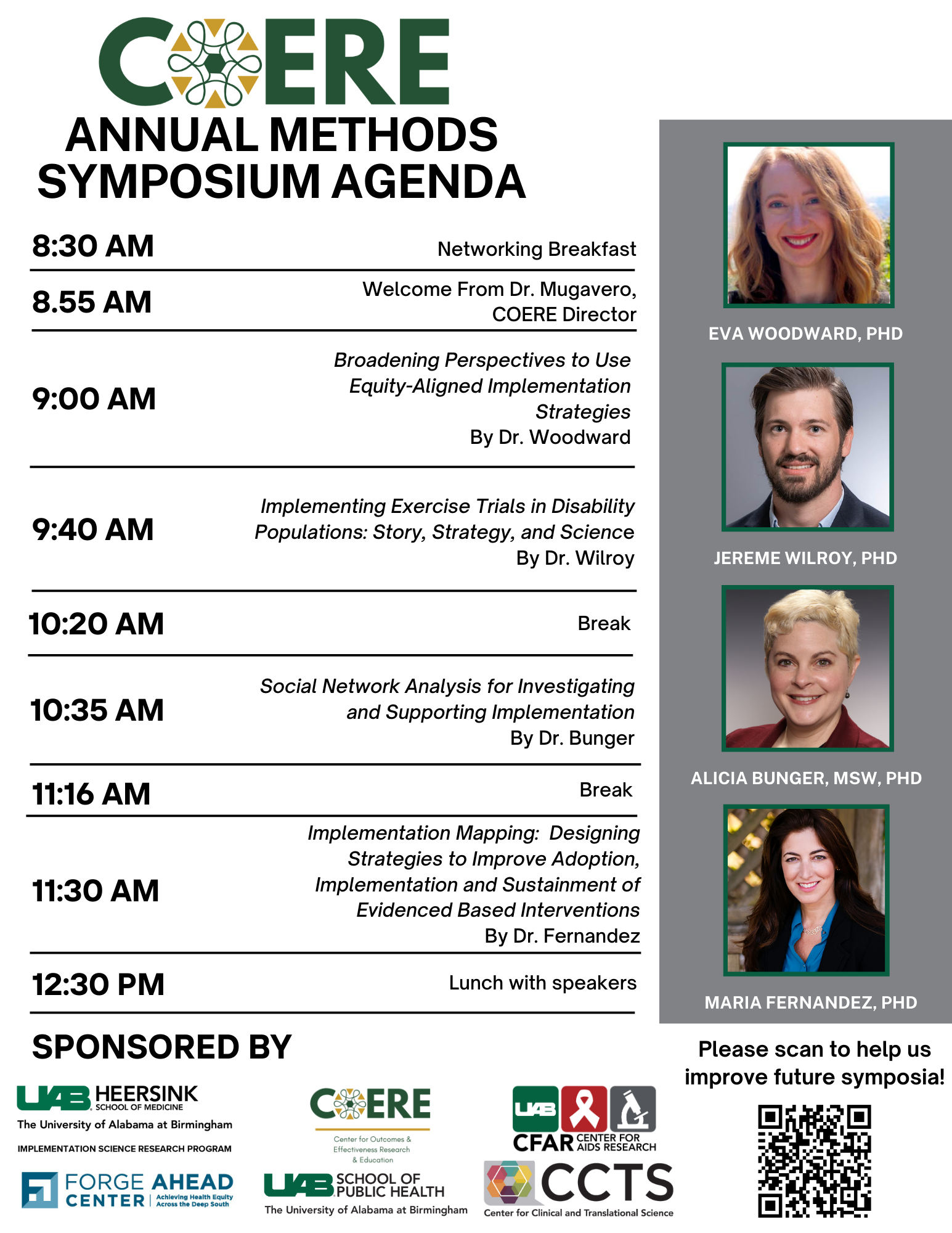
2023 Agenda
-
8:00am - 9:00am
Incorporating Photovoice into adolescent and young adult (AYA) social and behavioral health research
Dione King, PhD
University of Alabama at Birmingham -
9:00am - 10:00am
Collective Well-being: A Framework to Improve Population Health
Brita Roy, MD, MPH, MHS
NYU Grossman School of Medicine -
10:00am - 1:000am
Metrics for monitoring PrEP uptake: An equity-based approach
Patrick Sullivan, DVM, PhD
Emory University, Rollins School of Public Health -
11:00am - 12:00pm
Having Impact Through Research: You See My Glory But You Don’t Know My Story
Meredith Kilgore Endowed Lecturer
Gbenga Ogedegbe, MD, MPH
NYU Grossman School of Medicine
2022 Agenda
-
8:00am - 8:50am
Optimization of Behavioral and Biobehavioral Interventions: A MOST Primer
Rachel Wells, PhD, MSN, RN, CNL
University of Alabama at Birmingham -
9:00am - 9:50am
Applying the Multiphase Optimization Strategy (MOST) to Your Field: A Case Study in Child Maltreatment Prevention
Kate Guastaferro, PhD, MPH
Penn State College of Health and Human Development -
10:00am - 10:50am
SMART Lifestyle Interventions for Improving Health and Wellbeing in People with Obesity
Drew Sayer, PhD
University of Alabama at Birmingham -
11:00am - 12:30pm
The multiphase optimization strategy (MOST): Current and future directions
Meredith Kilgore Endowed Lecturer
Linda Collins, PhD
NYU School of Global Public Health
-
8:00am - 9:00am
-
2024 Speakers
-
María E. Fernández, PhD
María E. Fernández, PhD
María E. Fernández, PhD
UTHealth Houston
Dr. María Fernández is Vice President of Population Health and Implementation Science at the University of Texas Health Science Center at Houston (UTHealth Houston) and the founding Co-Director of the UTHealth Houston Institute for Implementation Science. Dr. Fernández is also the Lorne Bain Distinguished Professor of Public Health and Medicine, Professor of Health Promotion and Behavioral Sciences, and Director of the UTHealth Houston Center for Health Promotion and Prevention Research (CHPPR) at the UTHealth Houston School of Public Health. As a researcher and a leader, Dr. Fernández has spent her career conducting participatory community-engaged research and practice to develop, evaluate, implement, and disseminate interventions to improve health and health equity. Her research focuses on cancer and chronic disease prevention and control among underserved populations in the U.S. and globally. Dr. Fernández is an expert in dissemination and implementation (D&I) research, having served as a member of the National Institutes of Health (NIH) Dissemination and Implementation Research in Health Study Section and as faculty for several national and international D&I training programs. Dr. Fernández has an extensive portfolio of global, federal, and state-funded research developing and improving evidence-based interventions and guidelines for the prevention and control of cancer, diabetes, and cardiovascular disease in clinical and public health settings. Dr. Fernández has over 200 peer-reviewed publications and has co-authored several books, including the 4th edition of Planning Health Promotion Programs: An Intervention Mapping Approach (2016) and the Handbook of Community-based Participatory Research (2017). Her awards include the Association for Schools and Programs of Public Health Research Excellence Award and the UTHealth President's Scholar Award for Research Excellence. -
Alicia C. Bunger, MSW, PhD
Alicia C. Bunger, MSW, PhD
Alicia C. Bunger, MSW, PhD
The Ohio State University
Alicia C. Bunger, MSW, PhD is an Associate Professor at the College of Social Work at The Ohio State University. Her research program centers on how health and human service organizations coordinate to implement evidence-based interventions, promote service access across systems, and integrate care for children and families. Bunger’s research engages community partners to examine organizational and system-level strategies by blending implementation and inter-organizational relationships research. This work often focuses on the intersection of child welfare and behavioral health systems. It is designed to inform strategies for closing gaps in care access and quality. She is trained as a mental health services researcher with an emphasis on implementation in organizations and systems. Bunger earned a PhD in social work from Washington University in St. Louis and completed post-doctoral training in mental health services and systems research at the University of North Carolina at Chapel Hill. Her work has been funded by the National Institutes of Health, Robert Wood Johnson Foundation, and US Children’s Bureau, among others. Bunger's profile at the College of Social Work can be found here: https://csw.osu.edu/about/faculty-staff/faculty-directory/bunger-alicia-ph-d/ -
Eva Woodward, PhD
Eva Woodward, PhD
Eva Woodward, PhD
University of Arkansas for Medical Sciences
Dr. Eva Woodward is a clinical health psychologist and implementation scientist. In her research, she uses implementation science and practice, community engaged research, and mixed methods to improve equitable health care delivery for groups experiencing disparities and oppression, such as racially minoritized, sexual minority (lesbian, gay, bisexual, queer), low-income, and rural-dwelling individuals. Her work focuses on implementing interventions in hospital settings. She complements her research as a clinician in primary care mental health integration. She is also a trainer for the Implementation Facilitation Learning Hub operated by Behavioral Health Quality Enhancement Research Initiative through the Veterans Health Administration. Dr. Woodward currently works at the VA Center for Mental Healthcare and Outcomes Research (Little Rock, Arkansas) and University of Arkansas for Medical Sciences. Originally from rural Oklahoma, she trained at Suffolk University in Boston (Ph.D.) and Brown University in Providence (internship/residency). Dr. Woodward completed the two-year Advanced Fellowship Program at the VA South Central Mental Illness Research, Education and Clinical Center in Little Rock before becoming faculty. She also graduated from the NIH Health Disparities Research Institute, and the Implementation Research Institute fellowship at Washington University in St. Louis. As a trainee, she was awarded the Distinguished Student Contribution from the American Psychological Association’s division on Sexual Orientation and Gender Diversity. Research interests: implementation science, health equity, primary care mental health integration, health psychology, implementation facilitation. -
Jereme Wilroy, PhD
Jereme Wilroy, PhD
Jereme Wilroy, PhD
University of Alabama at Birmingham
Dr. Wilroy received his B.S. degree in Exercise Science, M.A. in Health Studies, and PhD in Health Education and Promotion from the University of Alabama. He completed two post-doctoral fellowships; one-year at Lakeshore Foundation in Birmingham, Alabama, and two years at the University of Alabama at Birmingham. He began his research career at UA as a master’s student surveying individuals with disabilities about topics of interest for a holistic health website. As a doctoral student, he developed and validated a theory-based instrument to predict physical activity among people with spinal cord injury as part of his dissertation and funded with a fellowship through the graduate school. As a post-doc, he obtained a fellowship from the Craig H. Neilsen Foundation and developed an online program for increasing physical activity behavior among people with spinal cord injury. Dr. Wilroy’s research philosophy is to conduct research that centers on the needs of the patient and improves the capacity of clinicians to recommend specific exercise routines. The focus of his research is on the psychosocial aspects of adherence to exercise trials among people with physical disabilities. His current research projects include: a) recruiting PM&R patients into a large randomized controlled trial of a home-based exercise intervention, and b) identifying decisions points for piloting a sequential multiphase assignment randomized trial of an exercise and behavioral coaching intervention for people with physical disabilities.
2023 Speakers
-
Olugbenga Ogedegbe, MD, MPH
Olugbenga Ogedegbe, MD, MPH
Gbenga Ogedegbe, MD, MPH
NYU Grossman School of Medicine
Gbenga Ogedegbe, a physician, is Professor of Population Health & Medicine, Chief Division of Health & Behavior, and Director Center for Healthful Behavior Change at the NYU Grossman School of Medicine. Gbenga is a leading expert on health disparities research; his work focuses on the implementation of evidence-based interventions for cardiovascular risk reduction in minority populations. He is Principal Investigator on numerous NIH projects and has expanded his work globally to Sub-Saharan Africa where he is funded by the NIH to strengthen research capacity and reduce the burden of non-communicable diseases. He has co-authored over 250 publications and his work has been recognized by receipt of several research and mentoring awards including the prestigious John M. Eisenberg Excellence in Mentorship Award from the Agency for Healthcare Research and Quality, and the Daniel Savage Science Award. He has served on numerous scientific panels including the NIH, CDC, World Health Organization, and the European Union Research Council. Prior to joining NYU, he was faculty at Cornell Weill Medical School and Columbia University College of Physicians and Surgeons. -
Patrick Sullivan, DVM, PhD
Patrick Sullivan, DVM, PhD
Patrick Sullivan, DVM, PhD
Emory University, Rollins School of Public Health
Patrick Sullivan is the Charles Howard Candler Professor of Epidemiology at Emory University’s Rollins School of Public Health, and Co-Director of the Prevention Sciences Core at Emory’s Center for AIDS Research (CFAR). He has worked in HIV prevention for 26 years. Before coming to his current position at Emory, Patrick worked at CDC as an EIS officer and in HIV Surveillance programs.
Dr. Sullivan’s research focuses on HIV among men who have sex with men, including behavioral research, interventions, implementation, and surveillance, and he is a PI in the UNC/Emory Adolescent Trials Network Center and a member of the HPTN SGM Scientific Committee. -
Dione King, PhD
Dione King, PhD
Dione King, PhD
University of Alabama at Birmingham
Dione King is an Associate Professor in the Department of Social Work at UAB's College of Arts and Sciences. Dr. King’s long-standing commitment to disadvantaged, vulnerable, and marginalized populations is evidenced through her professional and research experiences working with children and families in juvenile justice, child welfare, education, nonprofit, and homeless/transitional housing settings. Her research focuses on health behaviors and health disparities that impact the adolescent and young adult life experience including dating violence, delinquency, substance use, mental health, and sexual risk behaviors while giving attention to social determinants of health and the promotion of health behaviors.
Dr. King lives by the motto, “Injustice anywhere is a threat to justice. We are caught in an inescapable network of mutuality, tied in a single garment of destiny. Whatever affects one directly, affects all indirectly.” This quote taken directly from Dr. Martin Luther King Jr.’s 1963 Letter from a Birmingham jail has resonated with her as a social worker and reflects the impact she seeks to make in the lives of individuals, families, communities, and systems. -
Brita Roy, MD, MPH, MHS
Brita Roy, MD, MPH, MHS
Brita Roy, MD, MPH, MHS
NYU Grossman School of Medicine
Brita Roy, MD, MPH, MHS is Associate Professor of Population Health and Medicine and Director of Community Health and Clinical Outcomes for Beyond Bridges.
Dr. Roy is a clinician-investigator who uses epidemiology, complex systems modeling, and community-engaged approaches to investigate the effect of positive psychosocial factors on health outcomes at the individual, community, and clinic/health system levels. She co-authored an evidence-based, actionable, community-level theoretical framework defining and describing collective well-being and its drivers and outcomes. She works to implement programs and processes to improve health outcomes equitably across our health system and communities that we serve. Finally, Dr. Roy also enjoys teaching health professions students and internal medicine residents in the classroom while taking care of a diverse array of patients on the inpatient general medicine service.
2022 Speakers
-
Linda M. Collins, PhD

Linda M. Collins, PhD
Linda M. Collins, PhD
NYU School of Global Public Health
Linda M. Collins is Professor of Global Public Health in the Department of Social and Behavioral Sciences, with a secondary appointment in the Department of Biostatistics. She earned her B.A. in Psychology at the University of Connecticut and her Ph.D. in Quantitative Psychology at the University of Southern California.
Collins’ research interests are focused on the development, dissemination, and application of the multiphase optimization strategy (MOST), a framework for the optimization of behavioral, biobehavioral, and social-structural interventions. The objective of MOST is to improve intervention effectiveness, efficiency, economy, and scalability. She is currently collaborating on research applying MOST in the areas of smoking cessation, the prevention of excessive drinking and risky sex in college students, and HIV services. -
Kate Guastaferro, PhD, MPH

Kate Guastaferro, PhD, MPH
Kate Guastaferro, PhD, MPH
Penn State College of Health and Human Development
Kate Guastaferro, Ph.D. is an Assistant Research Professor in the Center for Healthy Children, and an affiliate of the Child Maltreatment Solutions Network as well as the Edna Bennett Pierce Prevention Research Center, at The Pennsylvania State University. Kate’s program of research sits at the intersection of prevention science and innovative methods.
Kate is committed to the prevention of child maltreatment. Her focus during her time at Penn State has focused predominantly on the prevention of child sexual abuse. Kate led the development of a parent-focused child sexual abuse prevention module designed to be added to existing evidence-based programs. She also collaborates with Dr. Jennie Noll on the implementation and evaluation of a state-wide child sexual abuse prevention strategy.
She is also interested in innovative methods for intervention development, optimization, and evaluation. She is an expert in the multiphase optimization strategy (MOST), an engineering inspired framework for building interventions that are effective, efficient, economical, and scalable. Kate has experience applying MOST to a variety of public health problems, including STI prevention among first year college students.
Kate received her PhD in Public Health from Georgia State University in 2016, receiving the Public Health Achievement Award recognizing her scholarship and academic success. She completed her undergraduate work at Boston University in 2008 and received her MPH from Georgia State in 2011. Kate’s vision is to integrate her substantive and methodological interests to develop, optimize, evaluate, and disseminate child maltreatment prevention programs that are effective, efficient, economical, and scalable. -
Drew Sayer, PhD

Drew Sayer, PhD
Drew Sayer, PhD
The University of Alabama at Birmingham
Dr. Sayer is Assistant Professor in the Department of Nutrition Sciences at the University of Alabama at Birmingham. His clinical research relies heavily on the Multiphase Optimization Strategy (MOST) Framework and, in particular, the Sequential Multiple Assignment Randomized Trial (SMART) experimental approach. Using these approaches, Dr. Sayer is conducting 3 ongoing SMARTs with an overarching goal of developing effective, efficient, and personalized adaptive treatment strategies for improving the health and wellbeing of people with obesity. -
Rachel Wells, PhD, MSN, RN, CNL

Rachel Wells, PhD, MSN, RN, CNL
Rachel Wells, PhD, MSN, RN, CNL
University of Alabama at Birmingham
Dr. Rachel Wells is a NIH/NINR-funded (1K99NR019854) postdoctoral fellow at the University of Alabama at Birmingham School of Nursing. She received a BS in Microbiology, English, and Latin/Greek (2006) from the University of Alabama and MSN (2010) and PhD (2019) in Nursing from the University of Alabama at Birmingham. She has an extensive clinical background in critical care and adult cardiovascular health.
Dr. Wells’ cardiovascular nursing practice, experiences in seeking specialty care as a rural dweller, and research experiences as a palliative nurse coordinator inspire her research interest in optimizing early palliative care models for under-resourced advanced heart failure patients and their family caregivers in the rural Deep South. She is interested in improving cardiovascular outcomes and pain management disparities and access to care for those living with advanced heart failure and other serious illness through innovative behavioral intervention development.
-
María E. Fernández, PhD
-
For more information, please contact Amber Ganoe
aganoe@uabmc.edu
Methods Symposium
Initiated in 2009, the annual Methods Symposium is a signature program of the UAB Center for Outcomes and Effectiveness Research and Education. The overarching goal of the Methods Symposium is to provide a general overview and framework for recent developments and novel directions in a health services research (HSR) methodological area. The Symposium is intended for an interdisciplinary and interprofessional HSR audience across the career arc, from students to faculty at all ranks, and includes presentations from national thought leaders in a timely thematic methodological area, culminating with the Meredith Kilgore Endowed Lectureship sponsored by the UAB School of Public Health. The Kilgore Endowed Lectureship was established in 2020 to honor the late Dr. Kilgore’s innumerable contributions to HSR, mentorship, and training at UAB, including roles as Co-Director of the COERE and its AHRQ T32 until his untimely passing in 2019. Previously held in-person, the COERE is pleased to now offer the Symposium in hybrid format.



